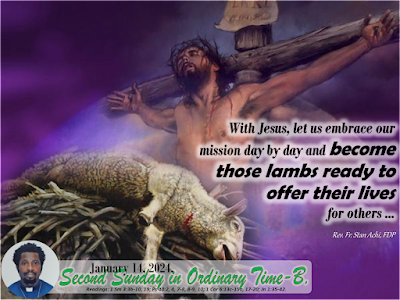THE MISSION OF THE LAMB.
January 14, 2024.
Second Sunday in Ordinary Time – B.
Readings: 1 Sm 3:3b-10, 19; Ps 40:2, 4, 7-8, 8-9, 10; 1 Cor6:13c-15a, 17-20; Jn 1:35-42.
"Behold, the Lamb of God." Jn 1:36
A Kenyan proverb says: “It is not the lamb that should go
and ask the lion if it has had dinner.” A Bantu proverb adds: “It is when one
holds the sacrificial lamb that he begins to seek the gods.”
Baptism not only confers unto us an identity, but it is an
identity that comes with a mission. So, Baptism gives us a mission. Last
Monday, with sobriety, but with joy as well, we celebrated the Baptism of the
Lord. That marked the end of the Christmas season and the time of the infancy
of Jesus. It was also the beginning of his ordinary and public life. We are
today, the 2nd Sunday in the Ordinary Time B, and through the Prophet John,
Jesus is introduced to us as the Lamb of God. It is an image that bears a very
singular and significant meaning. He is the "Lamb," the sacrificial
victim, the one whose mission is to die for others, to be killed in expiation
for others' faults.
In the Jewish tradition and old Judaism, the lamb was
sacrificed at the first Passover, on the eve of the Exodus from Egypt, the most
momentous event in Jewish history. The lamb stands as a sacrificial victim, a
victim of expiation. Through the offering of the blood of the lamb, God's mercy
was obtained for people's sin and their protection (Exodus 12). The lamb stands
also as an oblation, a covenantal sacrifice. We have, for example, the episode
where Abraham was asked by the Lord to offer his son Isaac in sacrifice. When
he showed his firm faith in the Lord, instead of Isaac being sacrificed, God
offered him a lamb to be offered, and this sealed forever God's covenant with
Abraham and his house. (Genesis 22)
Borrowing from this Jewish meaning, Jesus is introduced at
the start of his public ministry as the Lamb of God. Let us not forget another
aspect of the lamb. It is a quiet, helpless animal. It is also very sensitive;
wherever it receives a knock, the lamb feels it in every part of its body. So, Jesus
is given this identity of sensitivity, docility, and simplicity in order to
share truly in our humanity.
The words of John have turned into a refrain that we repeat
at every Eucharistic celebration: "Behold, the lamb of God..." The
Catechism says: "Jesus is the Father's Emissary. From the beginning of his
ministry, he "called to him those whom he desired; ... And he appointed
twelve, whom also he named apostles, to be with him, and to be sent out to
preach." From then on, they would also be his "emissaries"
(Greek apostoloi). In them, Christ continues his own mission: "As the
Father has sent me, even so I send you." The apostles' ministry is the
continuation of his mission; Jesus said to the Twelve: "he who receives
you receives me."" CCC 858
So, here we are at the beginning of Jesus mission. And yet,
the end of this mission is already foreseen. He will be offered as a
sacrificial victim of expiation for the sins of all.
The Word of God tries to make clear to us how we arrive at
Jesus. In the first reading, we have the beautiful message of the vocation of
Samuel and the mediative word of the old man Eli. Samuel will get to know that
it is God calling him through Eli's advice and guidance. “Go to sleep, and if
you are called, reply, speak, Lord, for your servant is listening.” Like the
young Samuel, each one of us vocation's is made clear to us through human
mediation.
In the Gospel, this mediation is made quite clearer. John
played the mediation for Andrew and his companion, and Andrew for Simon his
brother… Through the help of others, we get to know the Lord, and we also get
to understand our calling. No one can become a saint alone and by himself.
Holiness is a journey we do together with others. It is by living as a
community that we build the perfect body of Christ, of which each one is a
member. We should, thus, learn to journey as a community with a concern for the
needs and the holiness of each other.





Comments
Post a Comment